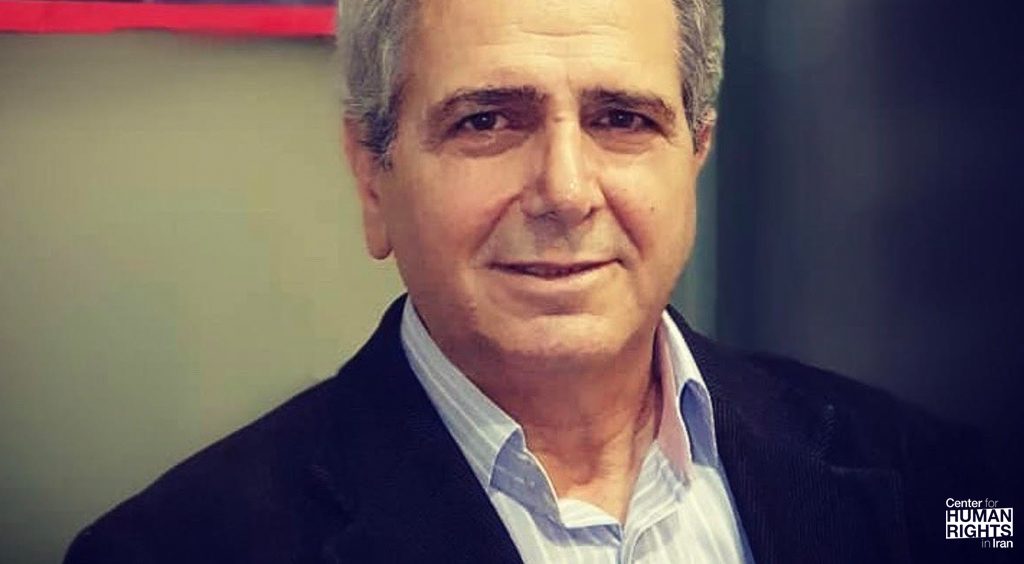CHRI – Iran’s Appeals Court upheld a one-year prison sentence against novelist Hamid Namjoo for the content of his writings and because he published work abroad, the Center for Human Rights in Iran (CHRI) has learned.

Namjoo’s prison sentence includes a two-year ban on him travelling outside the country and bans him from joining political groups, according to his brother, Mohsen Namjoo, a prominent Iranian musician now based in the U.S. who was also mentioned in the verdict as a “fugitive dissident anti-revolutionary singer” and who was also previously sentenced to prison in Iran for his artistic work.
“In December 2018, my brother’s house was raided by orders of the Culture and Media Court and his computer and manuscripts were confiscated,” Mohsen Namjoo—referred to by Western media outlets including the New York Times and the Guardian as Iran’s Bob Dylan—told CHRI on April 27, 2020.
“Hamid was in detention for three weeks before being released on bail but [in August 2019] Branch 26 of the Revolutionary Court sentenced him to a year in prison and banned him from traveling [outside the country] and from membership in political groups for two years,” he said. “The sentence has now been upheld.”
The verdict comes on the heels of ongoing news that relatives of well-known Iranian dissidents and activists based inside and outside the country are being charged and prosecuted in Iran on trumped-up charges.
Hamid did not have legal counsel during the preliminary trial or at the appeal hearing, according to Mohsen, who told CHRI that Hamid’s charges were based on his allegedly anti-state writings including an unpublished poem, a book he published in France, and for maintaining contact with his brother.
Hamid’s fictional novel, titled Spartacus, was published by Naakojaa Publishers in Paris.
“The book has five short stories without any real characters… But the verdict issued against him stated that in the book he sympathized with the [banned Mujahedin-e Khalq (MEK) organization] and criticized the Islamic Republic’s actions against that leftist Marxist group,” said Mohsen.
Mohsen told CHRI that the verdict also stated that Hamid “‘defiled’ the Islamic Republic of Iran in articles that he wrote for the ‘enemy station’ Radio Zamaneh [a Netherlands-based news website] … and contacted key members of the ‘anti-revolutionary’ Tudeh Party [defunct opposition party] as well as the ‘fugitive dissident anti-revolutionary singer’ Mohsen Namjoo and wrote an ‘insulting’ poem about the supreme leader and published it online.”
The Iranian judiciary has a documented history of sentencing individuals to prison for the content of their writings under trumped-up “national security” charges, particularly journalists and writers accused of challenging or criticizing state policies or officials.
Some of these cases include prominent writers and directors being summoned to serve prison time in the middle of Iran’s coronavirus pandemic, while thousands of other non-political prisoners are reportedly being released to limit their exposure to COVID-19.
Iran’s intelligence establishment also has a documented history of harassing and detaining activists’ and journalists’ family members as part of a long-established practice aimed at silencing Iranian citizens based abroad.
“Most of Hamid’s articles were about the economy,” Mohsen told CHRI. “They were published under a pseudonym for Radio Zamaneh. The poem mentioned in the verdict has not been published anywhere. Apparently, they found it in his belongings [confiscated during the raid on his house].”
Mohsen added that he found it “funny” that his brother had been accused of having contact with the Tudeh Party, a now-defunct communist organization whose members were severely persecutedincluding by extrajudicial executions amid the Islamic Republic’s crackdown on all opposition groups following the country’s 1979 revolution.
“I don’t even know how you can contact members of the Tudeh Party,” he said.
Mohsen, who along with his brother was born in Iran, has been living in the U.S. since 2009, the year he was sentenced in Tehran in-absentia to five years in prison for recording music that allegedly “dishonors” passages from the Quran.
Hamid was previously issued a one-year prison sentence in December 2018 for the charge of “propaganda against the state.” He served three weeks of his term and was granted early parole, according to the BBC.
The UN has urged Iranian authorities to release all political prisoners and dual nationals who remain behind bars despite the serious threat of COVID-19.
Read this article in Persian.
 Shabtabnews In this dark night, I have lost my way – Arise from a corner, oh you the star of guidance.
Shabtabnews In this dark night, I have lost my way – Arise from a corner, oh you the star of guidance.


